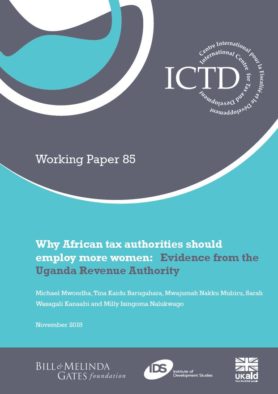ICTD Working Paper 85
Tax collection has historically – in Africa and in the rest of the world – been very much a male preserve. The situation is changing. Partly because of changes in the ways in which taxes are collected, women are entering the profession in increasing numbers. In Africa, they are still very much in the minority. The Uganda Revenue Authority (URA) is one of the few national tax administrations in Africa that has been employing large numbers of women for many years, and where the numbers of female and male employees are gradually approaching parity. What is the impact of this on staff performance and organisational growth? On the basis of a thorough study of the URA’s personnel records and a sample survey of 11 per cent of staff, four conclusions emerge. First, the only available indicator of staff performance – scores given to employees following their regular six-monthly appraisals – indicates that female staff on average perform slightly better than men. Second, in an organisation where rates of staff turnover can be high, female employees on average serve the organisation for slightly longer than men: 12.3 versus 11.6 years. Third, the rate of disciplinary actions against male employees is more than twice that against female employees. Fourth, both women and men are generally relaxed and satisfied with working in a mixed-gender environment – although there are some marginal concerns among men that they are especially likely to be posted to more remote areas of the country. These findings suggest that large-scale recruitment of women into tax administration probably improves organisational performance.
